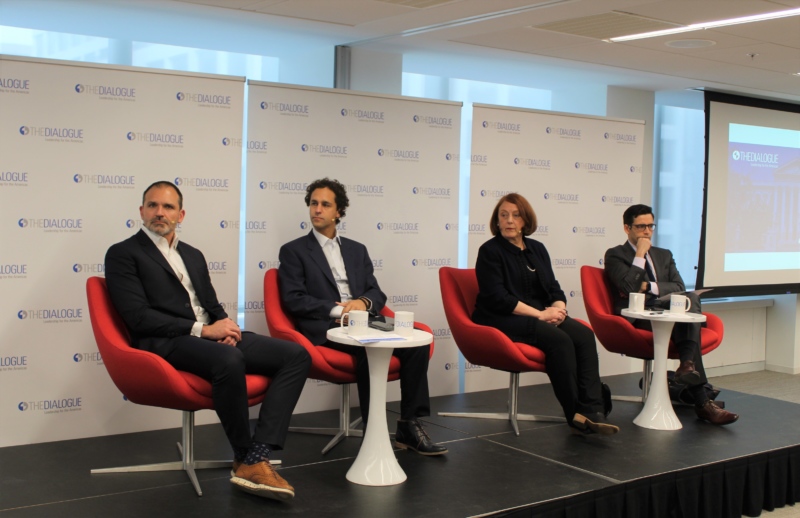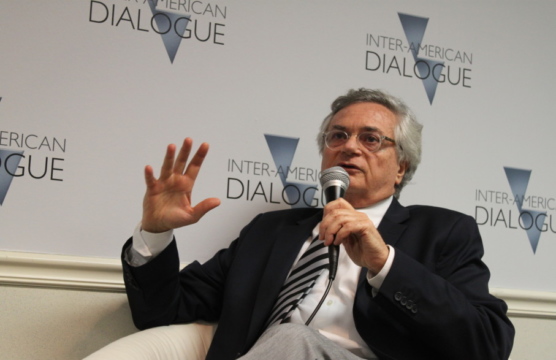Don’t “Chavez-ize” Foreign Policy
Nada le convendría más a Chávez que, en el momento en que la atención internacional está puesta en Piñera, tener con él una confrontación en su estilo que no reconoce maneras.
On April 11, the Inter-American Dialogue hosted an event to discuss the reforms proposed by Chilean President Sebastian Piñera to his country’s pension system. Dialogue President Michael Shifter offered opening remarks for the event which was moderated by Professor Sergio Uruza from the University of Maryland. The panelists were Fernando Larrain, Director General of the AFP Association in Chile; Dr. Olivia Mitchell, Director of the Wharton School’s Boettner Center for Pensions and Retirement Research at the University of Pennsylvania; and Truman Packard, a lead economist at the World Bank.
During his opening remarks, Shifter provided background on the Chilean Pension system, which he described as one of the most influential systems in Latin America, reformed in the early 1980s. He also described issues with the current system and questions that have arisen from Piñera’s proposed changes.
Francisco Larraín predicted that pensions will be the second most important policy debate of the next 20 years after climate change, pointing out that many other Latin American countries are looking to reform their pension systems. He remarked on the importance of factors such as wide coverage, good density of contributions, and a formal job market as well as institutions that remain intact through different administrations for pensions systems to be successful. He also framed the elements that contribute to successful pensions systems- solidarity, contributory and voluntary. However, demographically, Chile has changed over the last 40 years resulting in shifts to these pillars. For instance, the voluntary pillar which corresponds to individual contributions has been affected by fast demographic changes, delayed entry to the workforce and inter-generational differences over the right to choose the pensions systems. Furthermore, longer life expectancy affects the contributor pillar. To meet the demands of this changing demographic, the government should increase spending to meet OECD standards, outlining necessary changes to the solidarity pillar.
Olivia Mitchell opened her statement by referencing the populist movements to eliminate AFPs and echoed some of Larraín's concerns, specially those related to higher life expectancy and sub-par government spending. She continued to provide an overview of past reforms and the recommendations of the Bravo commission, of which she was a member. Mitchell went on to provide a review of the current administration’s proposal which includes the expansion of the solidarity pillar which she worried would be difficult to fund. It requires employers to pay 4% of salary to individual accounts, a partial lump-sum incentive to defer retirement, and encourages competition and a 5% commission for financial literacy programs. She concluded by stating that Chile would need to reinvent the pension system while focusing on raising the retirement age.
Truman Packard spoke about magic numbers which refer to the defined benefit promise that drives voters to support one candidate over another, in Chile’s case he suggested it would be around 70%. He pointed out that this is rarely achieved which in turn causes discontent among voters. He attributed this to a “convenient confusion that you can go to a limited contribution system to reach the defined benefit.” In turn he stated that policy debates focus too much on secondary issues and that they should focus on fundamentals such as the debate between risk pooling vs individual savings. Ultimately, he argued that governments should focus on greater transparency and being honest to their voters.
The event concluded with a Q&A session. One member of the audience asked about addressing the free rider problem associated with the current system and Mitchell stated that financial literacy could play a role in clarifying that pensions are not taxes but investments in retirement. She also suggested creating incentives for people to save money, to which Packard agreed. Another audience member inquired about potential challenges to passing reforms. Larraín described the complex process to pass a bill in the Chilean congress and also remarked on the challenges posed by a labor market that is not expanding and the challenges of dealing with the populist movements that oppose AFPs. A third question was about expanding the pool of providers to include other financial institutions. Packard pointed out the contradiction of saying that people will benefit from decentralized market competition while closing the markets for other providers. However, he acknowledged that the real world requires some protections and “Chinese walls” to deal with issues of governance and protecting people’s savings.
Nada le convendría más a Chávez que, en el momento en que la atención internacional está puesta en Piñera, tener con él una confrontación en su estilo que no reconoce maneras.
Pension reforms in Latin America have shifted between an emphasis on coverage, adequacy, and sustainability.
Chile has been rocked with corruption scandals and political unease. Two of Latin America’s leading thinkers discuss why.
 Leonie Rauls / Inter-American Dialogue
Leonie Rauls / Inter-American Dialogue

 Video
Video